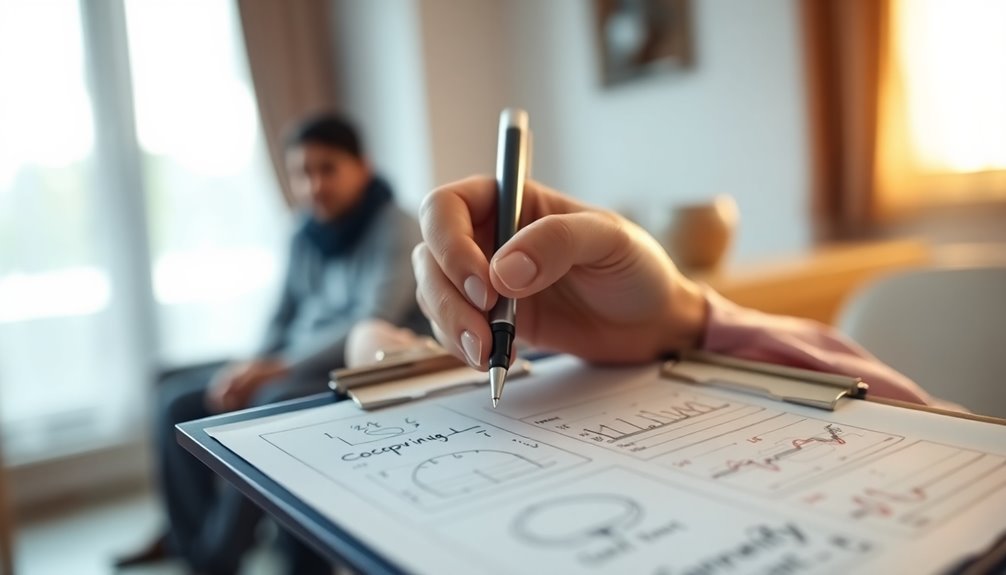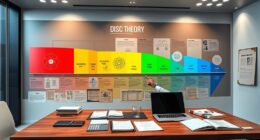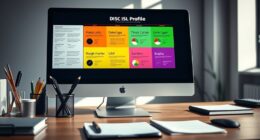Sending a thank you email after your interview is essential—it can boost your chances of getting hired by 22%! Make sure to send it within 24 hours to show your enthusiasm and professionalism. Start with a clear subject line and express genuine gratitude for the opportunity. Personalize your message by referencing specific points from the conversation, reinforcing how your skills align with the company's goals. Avoid generic phrases and common mistakes like poor grammar. If you want to make a lasting impression, check out our 10 tailored templates that can elevate your thank you note to the next level!
Key Takeaways
- Personalize your thank you email by referencing specific topics discussed during the interview to enhance relatability and connection.
- Use a clear subject line, such as "Thank You for the Interview," to ensure your email is easily identifiable.
- Express genuine gratitude for the opportunity and the interviewer's time to demonstrate professionalism and appreciation.
- Highlight relevant skills and experiences that align with the company's goals to reinforce your fit for the position.
- Ensure your email is concise, well-formatted, and free of errors to maintain clarity and professionalism.
Importance of Thank You Emails

Sending a thank you email after your job interview can make a significant difference in how you're perceived by hiring managers. Many job seekers overlook this essential step, with a staggering 76% neglecting to send thank you emails. This oversight can greatly diminish your chances of making a positive impression. Research shows that 80% of hiring managers find thank you notes helpful in their decision-making process, highlighting their importance in the hiring landscape.
Sending a thank you email not only reinforces your genuine interest in the position but also enhances your likability and professionalism. In fact, 91% of hiring managers appreciate being acknowledged for their time and effort during the interview process. By taking a moment to express gratitude, you can stand out from the competition. Conversely, failing to send a thank you note can make you 22% less likely to be hired, emphasizing the potential consequences of overlooking this simple yet impactful gesture.
In today's competitive job market, thank you emails are not just a courtesy; they're a strategic move that can influence hiring decisions and contribute to a positive candidate experience. Don't miss this opportunity to make a lasting impression.
Timing for Sending Emails

Timing is crucial when it comes to sending thank you emails after a job interview. The ideal window to send a thank you email is within 24 hours post-interview. This not only reinforces your enthusiasm but also showcases your professionalism. If you can, aim to send a thank-you email within 30 minutes to 2 hours after your meeting. This quick response demonstrates your keenness, though remember that the quality of your message is still essential.
Emails sent within 48 hours of the interview can still be helpful, but delays beyond this timeframe might lessen their impact. To guarantee your thank you email is seen promptly, try to send it during typical office hours. This way, your message lands on the interviewer's desk when they're most likely to notice it.
If you haven't heard back after a week, it's wise to follow up. Just make sure to balance persistence with professionalism. By keeping an eye on the timing for sending emails, you can improve your chances of making a lasting impression.
Essential Elements of Emails
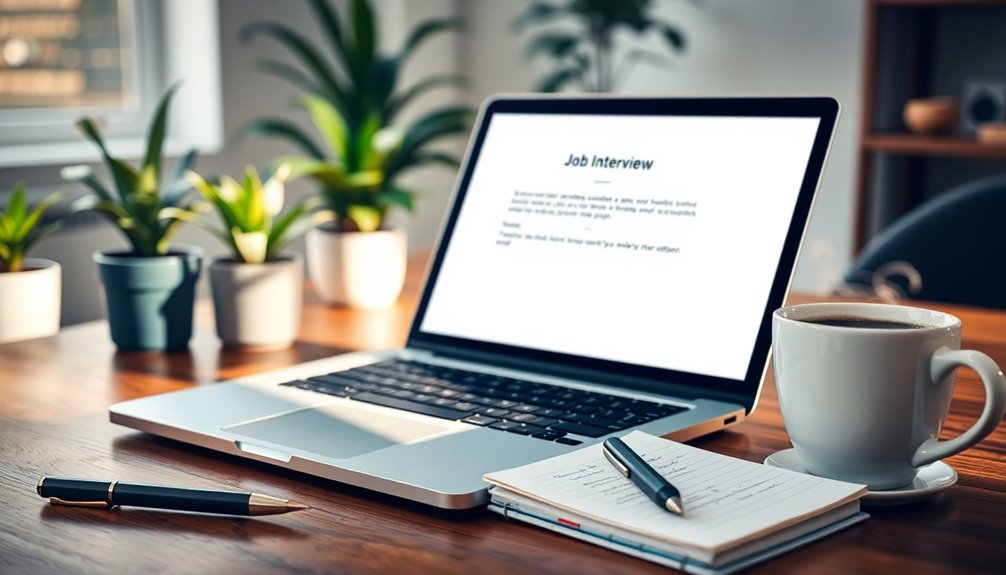
When crafting your thank you email, focus on key components that make your message stand out. Personalization techniques, like referencing specific discussions from your interview, can strengthen your connection with the interviewer. Remember, a clear subject line and a professional tone are essential for leaving a lasting impression.
Key Email Components
Crafting a thank-you email after a job interview involves several key components that can enhance its effectiveness. To guarantee your message stands out, consider these essential elements:
- Formal Greeting and Subject Line: Start with a polite greeting and a clear subject line like "Thank You for the Interview" to grab attention right away.
- Express Gratitude: Make certain to convey your appreciation for the interview opportunity. This not only shows your gratitude but also reinforces your interest in the position.
- Reference Unique Discussion Points: Mention something specific from the interview. This personal touch highlights your attentiveness and engagement, making your thank you note more memorable.
- Reiterate Skills and Experience: Emphasize how your skills align with the company's goals and express your enthusiasm for the role. This reinforces your fit for the position.
Finally, close your interview email with a professional sign-off and include your contact information. This guarantees clarity and keeps the lines of communication open for future interactions. Following these components will help you craft a compelling thank-you email that leaves a lasting impression.
#
Personalization Techniques
Personalization techniques can make a notable difference in the effectiveness of your thank-you email after a job interview. Tailoring your message not only shows appreciation but also makes you memorable—91% of hiring managers value a heartfelt thank you. To enhance your interview follow-up, reference specific topics discussed during your conversation. This illustrates genuine interest and reinforces your fit for the position.
Incorporate unique insights or anecdotes shared by the interviewer, showcasing your attentiveness and helping to build rapport. Remember, 76% of candidates neglect to follow up, so standing out is vital. Customize the tone of your email based on the company culture and the interviewer's personality. This adaptability reflects your understanding of the workplace environment.
Additionally, weave in personal details gathered during the interview, like the interviewer's interests or insights about team dynamics. This creates a relatable and impactful thank you message, enhancing your connection with the interviewer. By implementing these personalization techniques, you greatly increase your chances of making a lasting impression and progressing in the hiring process. Moreover, maintaining positive energy in your communication can help attract a favorable response from the employer.
## Personalization Techniques
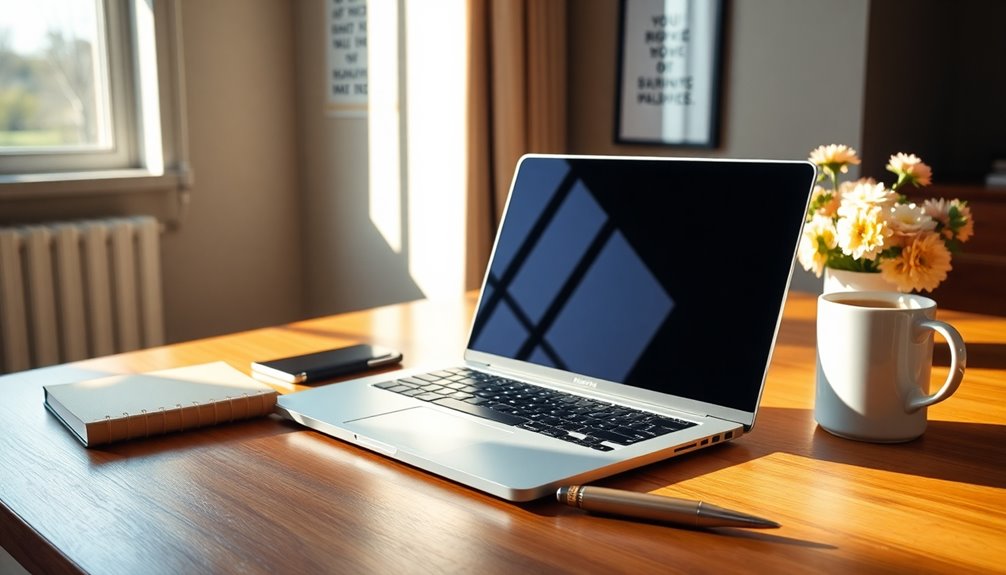
When you write your thank you email, reference specific highlights from your interview to show you were engaged and attentive. Customize your message based on insights shared, which not only reflects your interest but also aligns with the company's culture. This personal touch can make your follow-up stand out in a competitive job market.
Reference Interview Highlights
Incorporating specific highlights from your interview into your thank you email can make a significant difference in how it's received. When you personalize your message, you not only thank the interviewer but also reiterate your interest in the opportunity within the company. Here are four effective ways to reference interview highlights:
- Mention Key Topics: Reference specific topics discussed, showing you paid attention and are aligned with the company's needs.
- Share Personal Insights: Relate a personal anecdote that connects to the conversation, enhancing rapport and making your email memorable.
- Outline Contributions: Highlight particular contributions you could make based on the interview discussion, reinforcing your fit for the role.
- Express Enthusiasm: Use this opportunity to reiterate your excitement about the position, emphasizing why the interview is a great chance for both you and the employer.
These techniques demonstrate your genuine interest and distinguish you from the 76% of candidates who don't follow up. By taking the time to personalize your thank you email, you increase the likelihood of a positive response and leave a lasting impression on the interviewer.
Customize Based on Insights
Customizing your thank you email based on insights from your interview can greatly enhance its impact. By personalizing your message, you demonstrate attentiveness and engagement. Here are key elements to include:
| Element | Example |
|---|---|
| Reference Topics | "I appreciated our discussion on the company's innovative approach to sustainability." |
| Incorporate Anecdotes | "Your story about the team's recent project really resonated with me." |
| Follow-Up Questions | "Could you share more about the upcoming challenges your team is facing?" |
Using the interviewer's name and title appropriately reflects professionalism. Mention unique qualities of the company that resonate with you, showcasing your genuine interest. For instance, if the organization values diversity, you might say, "I admire your commitment to fostering an inclusive workplace."
Additionally, including thoughtful follow-up questions reinforces your enthusiasm and readiness to contribute to the team. When you personalize your thank you email this way, you create a stronger connection that can lead to higher response rates and increased chances of progressing in the interview process.
Common Mistakes to Avoid

Sending a thank-you email after your job interview is an essential step, but several common mistakes can undermine your effort. To guarantee your message hits the mark, avoid these pitfalls:
- Timing: Don't send your thank-you email too late. Aim for within 48 hours; otherwise, you risk appearing less enthusiastic and missing a chance to make a strong impression.
- Tone: Steer clear of overly casual language. Your tone should reflect professionalism and align with the company culture, so choose your words wisely.
- Generic Messages: Always personalize your message. Generic thank-you notes lacking specific references to your interview can come off as insincere and unmemorable. Mention specific topics discussed or shared experiences.
- Proofreading: Don't skip proofreading. Typos and grammatical errors can undermine your professionalism. Take the time to read your email carefully before hitting send.
Templates for Various Scenarios
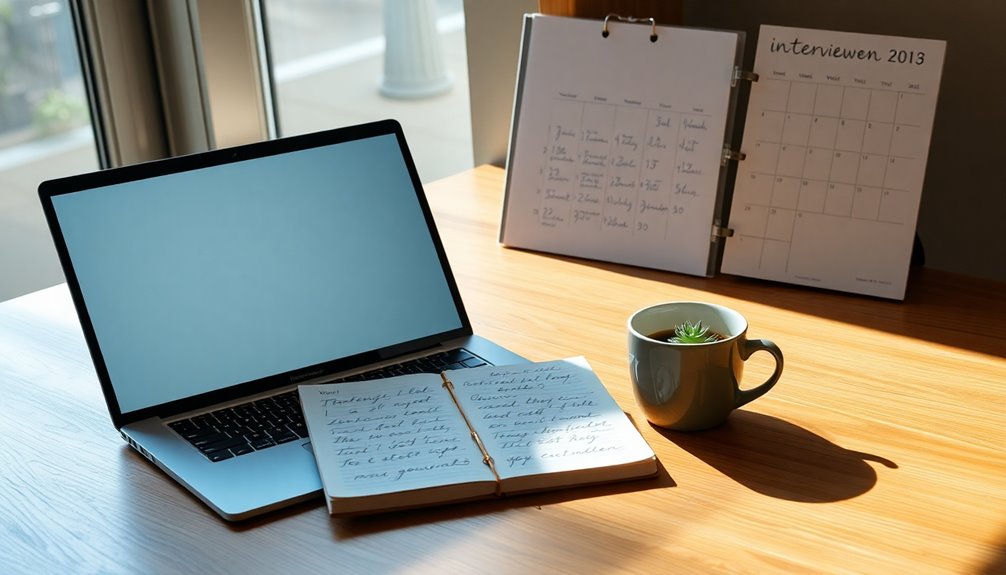
When it comes to sending thank you emails, having the right templates for different interview scenarios can make all the difference. Whether you're following up after a phone interview, an in-person meeting, or a group discussion, customizing your message is key. Let's explore some effective examples to help you express your gratitude and reinforce your interest in the position.
Phone Interview Templates
Crafting a thank you email after a phone interview is essential for making a lasting impression on your potential employer. Sending this email within 24 hours shows your enthusiasm and reinforces your interest in the position. Here are four key elements to include in your email:
- Subject Line: Use a clear and professional subject line like "Thank You for the Opportunity" so your email stands out in their inbox.
- Personalization: Reference specific topics discussed during the interview. This shows you were engaged and helps you stay memorable.
- Qualifications Recap: Briefly recap your qualifications and how they align with the company's needs. This reiterates your fit for the role.
- Offer to Follow Up: Mention that you're happy to provide any additional information or answer further questions. This showcases your willingness to keep the communication going.
In your email after the phone interview, make sure to express how much you appreciate the opportunity. Doing so not only shows gratitude but also keeps you top of mind for the interviewer.
In-Person Interview Examples
After completing a phone interview, it's important to follow up with a thank you email, but the same principle applies to in-person interviews. Sending your thank you email within 24 hours reinforces your interest in the position and demonstrates professionalism. Personalization is key; reference specific discussions or insights shared during the interview to make your note stand out.
Here's a quick guide to help you craft your thank you email based on the interview scenario:
| Scenario | Key Points to Include |
|---|---|
| One-on-One Interview | Express my gratitude for the opportunity, mention a specific topic discussed, and reiterate your enthusiasm for the role. |
| Group Interview | Thank each interviewer by name, highlight key conversations, and explain how your skills align with the team's needs. |
| Final Interview | Recap your main qualifications, express my gratitude for the process, and affirm your excitement about the potential fit. |
| Informational Interview | Thank the person for their insights, mention what you learned, and express interest in future opportunities. |
Each of these templates can be tailored to reflect the unique dynamics of your interview experience.
Follow-Up Email Samples
A well-crafted follow-up email can make a significant difference in your job application process. Follow-up emails reinforce your candidacy and can help you stand out. In fact, 80% of hiring managers find these communications helpful in their decision-making. To make your thank you email effective, consider the following:
- Send it promptly: Aim to send your follow-up email within 24 hours post-interview to show your enthusiasm.
- Personalization is key: Reference specific topics discussed during the interview to create a connection and demonstrate your attentiveness.
- Clear subject line: Use straightforward subject lines like "Thank You for Your Time" to guarantee your email is easily identifiable.
- Utilize templates: Streamline the writing process by using templates, while customizing them to reflect your experiences and the company culture.
Incorporating these elements into your follow-up emails will not only increase your chances of a response but also showcase your professionalism and genuine interest in the role. Don't underestimate the power of a thoughtful thank you email!
Follow-Up Strategies
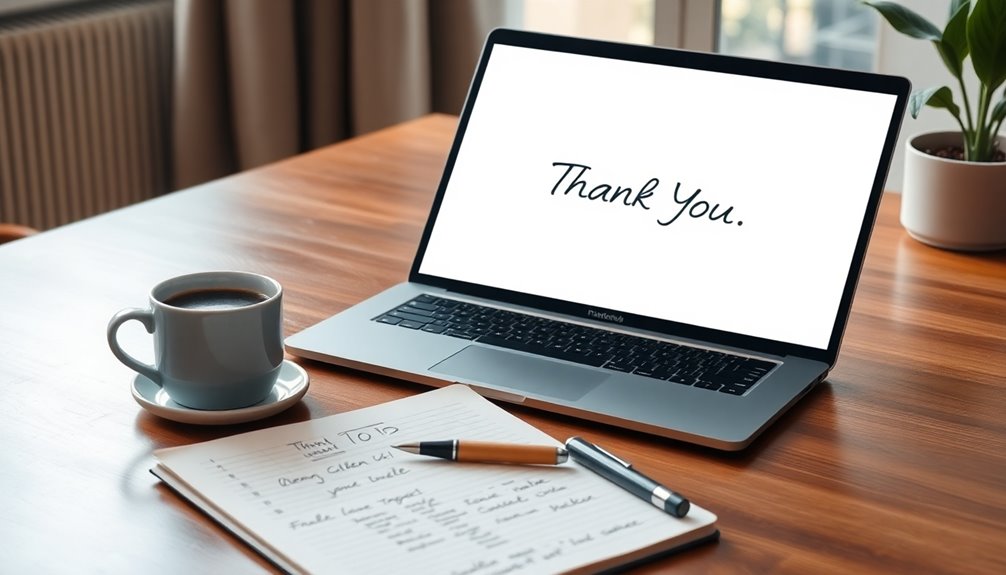
Timely follow-up emails are essential in the job interview process. Sending a thank you email within 24 hours shows your enthusiasm and helps maintain a positive impression with the interviewer. In your interview thank you email, personalize the message by referencing specific topics discussed during the interview. This strengthens your connection and highlights your suitability for the position.
If you haven't received a response within a week, consider sending a concise and polite follow-up email. This reinforces your interest in the role and requests updates on your application status. Remember, clear and concise subject lines, like "Thank You for Your Time" or "Follow-Up on [Position Title] Interview," can enhance the likelihood of your email being opened and read.
When closing your follow-up email, include your contact information to promote easy communication and maintain a professional tone throughout your correspondence. Effective follow-up strategies not only demonstrate your interest but also keep you on the interviewer's radar. By implementing these techniques, you increase your chances of making a lasting impression and moving forward in the hiring process.
Crafting the Perfect Subject Line
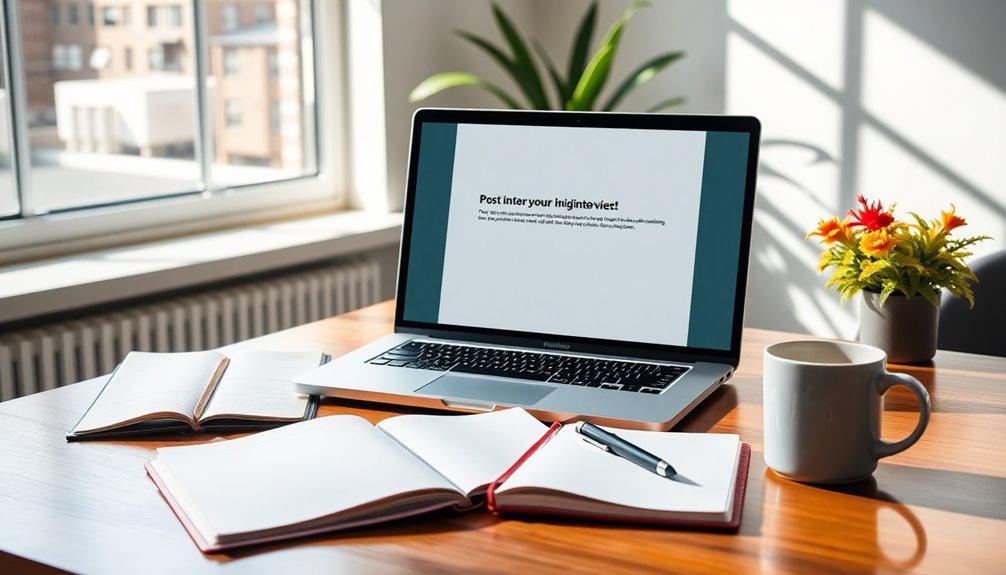
Crafting the perfect subject line for your thank you email can greatly influence whether your message gets noticed. A clear and concise subject line not only grabs attention but also conveys your appreciation effectively. Here are four tips to help you create an impactful subject line:
- Be Specific: Use phrases like "Thank You for the Interview" or "Gratitude for Our Conversation Regarding [Position Title]." This helps the interviewer quickly identify the context of your email.
- Personalize It: Avoid generic subject lines. Tailor your message based on your interview discussion to make it more memorable.
- Include the Position Title: Mentioning the position title in your subject line helps the interviewer recall your conversation, enhancing your email's relevance.
- Send a Timely Email: Aim to send your thank you email within 24 hours of the interview. This shows promptness and professionalism, reinforcing your interest in the role.
Examples of Effective Emails
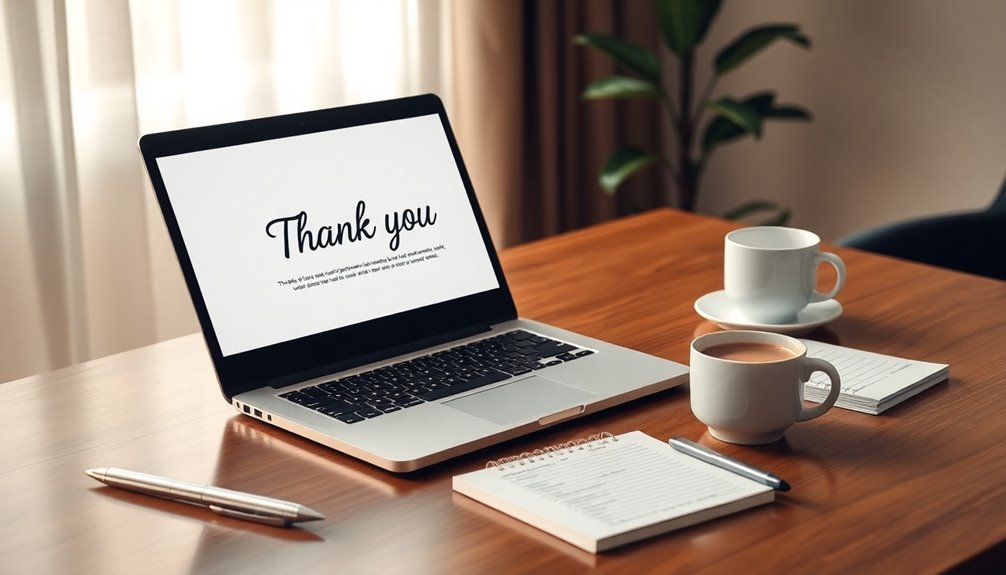
Sending a thank you email after your interview not only shows appreciation but also reinforces your candidacy. Research indicates that 80% of hiring managers find these emails helpful in their decision-making process. To stand out from the 76% of candidates who don't send follow-ups, you need to incorporate personalization into your message.
Begin with a formal greeting, then express gratitude for the opportunity. Recap key discussion points from the interview, and include a specific anecdote or detail that highlights your genuine interest. For instance, if you discussed a project you're passionate about, mention it briefly to remind them of your enthusiasm and fit for the role.
Reiterate your interest in the position and how your skills align with the company's goals. Avoid generic phrases and overly casual language to maintain professionalism. Finally, close with a courteous sign-off. By following this structure, your thank you email will not only convey your appreciation but also enhance your chances of making a memorable impression.
Enhancing Your Email Impact
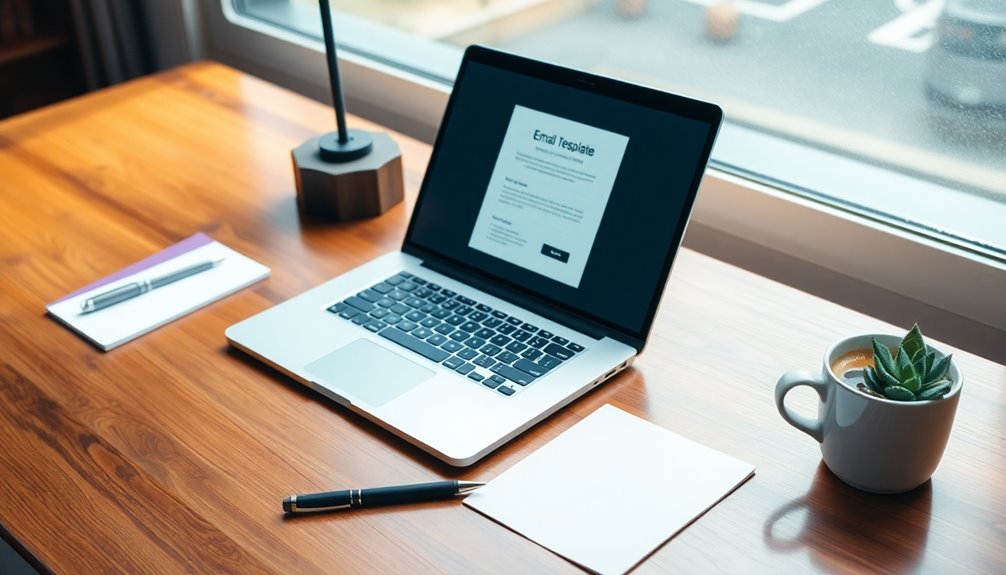
A well-crafted thank you email can greatly enhance your impact after an interview. To make your message stand out, focus on personalizing your emails and showcasing your engagement. Here are four effective strategies:
- Send within 24 hours: Timing matters. A prompt thank you email shows professionalism and enthusiasm for the role, keeping you fresh in the interviewer's mind.
- Personalize your messages: Reflect on specific topics discussed during your interview. Mentioning these details can create a stronger connection and demonstrate that you're genuinely interested in the position.
- Include unique insights: Share any valuable insights you gained during the interview. This not only reinforces your fit for the role but also shows you care about the company's values and mission.
- Use a clear subject line: A concise subject line like "Thank You for the Opportunity" guarantees your email stands out in a crowded inbox, increasing the chances it gets opened.
Frequently Asked Questions
How Do You Write an Amazing Thank You Email After an Interview?
To write an amazing thank you email after an interview, start by sending it within 24 hours. Make it personal by referencing specific topics discussed during your conversation. Keep a professional tone, expressing gratitude clearly while summarizing your fit for the role. Don't forget to include a concise subject line, like "Thank You for the Interview," to guarantee it stands out. This approach shows your attentiveness and reinforces your interest in the position.
How Do You Write a Thank You Email to Multiple Interviewers?
When you're writing a thank you email to multiple interviewers, it's essential to personalize each message. Reference specific topics you discussed with each person to show your appreciation. Avoid sending a group email; instead, reach out individually to acknowledge their unique contributions. Use a clear subject line, like "Thank You for the Opportunity," and aim to send your emails within 24 hours to demonstrate your enthusiasm and professionalism.
How Do I Thank Someone for an Interview Template?
To thank someone for an interview, start with a friendly greeting. Express your gratitude for the opportunity and mention something specific you discussed to make it personal. Reiterate your interest in the position and how you'd contribute to the team. Keep it concise and professional. Don't forget to proofread before sending. A clear subject line like "Thank You for the Interview" will help guarantee your email gets noticed.
How Do You Thank You for the Opportunity to Interview?
Sending a thank you note is like planting a seed in a garden; it can bloom into something beautiful. You've got a golden opportunity to express gratitude for the interview. Acknowledge the time they spent with you, mention specific discussions you enjoyed, and reiterate your enthusiasm for the role. This simple act can set you apart, showing you're not just a candidate, but someone who genuinely appreciates the chance to connect.
Conclusion
Sending a thank you email after your interview isn't just a nice gesture; it can greatly enhance your chances of landing the job. In fact, about 80% of hiring managers appreciate receiving them! By following the tips outlined in this article, you can craft a memorable message that sets you apart from other candidates. So, don't underestimate the power of a simple thank you—it's an essential step in your job search journey.
Felicity, our Author, pens in-depth articles and guides that delve into the heart of personal discovery. Her narrative-driven approach weaves together theory, practice, and personal anecdotes, making the journey of self-exploration both relatable and inspiring. Felicity’s contributions help illuminate the path for those seeking a deeper understanding of themselves and their relationships.





